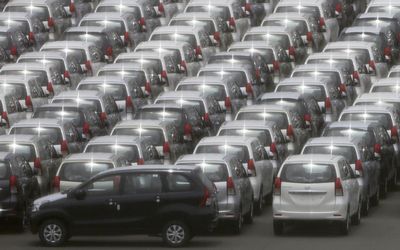IDC to drive empowerment with Chinese cars
by David Furlonger,
2015-12-09 06:12:25.0
THE government’s Industrial Development Corporation (IDC) might try to use its muscle in a new Chinese car manufacturing plant to extend empowerment in the domestic motor industry, CE Mvuleni Qhena said on Tuesday.
Trade and Industry Minister Rob Davies said last week the IDC would partner Chinese car maker Beijing Automotive Industry Co (BAIC) in a R12bn car plant that would eventually have the capacity to build 100,000 vehicles a year.
Mr Qhena said shareholding in the venture still had to be finalised, but the IDC would hold 20%-35%, and BAIC the rest. SA’s seven existing major manufacturers are all wholly foreign-owned.
Mr Qhena said the IDC could eventually sell its stake to "ordinary" South Africans.
"We take a long-term view of investments, but the intention is not to hold these shares forever," he said. "This could be an opportunity for South Africans to own part of a vehicle manufacturer."
The IDC also wanted to see more black involvement in the components supply industry. Almost all components companies that provide parts direct to vehicle production lines are foreign-owned and the government wants the industry to provide more opportunities for black-owned businesses offering sub-components and other services. Mr Davies has expressed disappointment at the pace of transformation so far.
Mr Qhena said SA-based executives were often limited in terms of the degree of empowerment they could apply because they reported to global shareholders that controlled sourcing decisions. As a shareholder in the new company, the IDC could "start to do what other people find difficult" by broadening black participation.
"I would hope that once we have shown what can be done, others will follow."
The actual BAIC-IDC investment is $800m, which at current exchange rates is just short of R12bn. However, that figure does not include land purchase.
Mr Qhena confirmed the new plant would probably be in the Eastern Cape. He said BAIC executives were swayed by available capacity at harbours in the province and the fact that it was already home to a large slice of the South African motor industry.
General Motors, Volkswagen and Mercedes-Benz build vehicles there, Ford has an engine plant and scores of components companies are nearby to supply them. The new company could make use of existing components suppliers.
IDC divisional executive Abel Malinga said the company hoped eventually to match the 70% local content boasted by companies such as Volkswagen and Toyota. However, a more realistic medium-term goal was 40%.
He said that once the site was chosen, construction would probably start next year and commercial production of vehicles in 2018. Initial production capacity would be 50,000 units, rising to 100,000.
Mr Qhena conceded, however, that it would take time for demand to reach 50,000 — even if as planned, two-thirds of production was exported, mainly to the rest of Africa. "Expansion will be dictated by the market," he said.
As a result, the plant would enjoy benefits from the amended Automotive Production and Development Programme, which from next month will offer limited production incentives to companies that build at least 10,000 vehicles annually. The minimum to access the full set of programme benefits remains 50,000.

Picture: REUTERS
THE government’s Industrial Development Corporation (IDC) might try to use its muscle in a new Chinese car manufacturing plant to extend empowerment in the domestic motor industry, CE Mvuleni Qhena said on Tuesday.
Trade and Industry Minister Rob Davies said last week the IDC would partner Chinese car maker Beijing Automotive Industry Co (BAIC) in a R12bn car plant that would eventually have the capacity to build 100,000 vehicles a year.
Mr Qhena said shareholding in the venture still had to be finalised, but the IDC would hold 20%-35%, and BAIC the rest. SA’s seven existing major manufacturers are all wholly foreign-owned.
Mr Qhena said the IDC could eventually sell its stake to "ordinary" South Africans.
"We take a long-term view of investments, but the intention is not to hold these shares forever," he said. "This could be an opportunity for South Africans to own part of a vehicle manufacturer."
The IDC also wanted to see more black involvement in the components supply industry. Almost all components companies that provide parts direct to vehicle production lines are foreign-owned and the government wants the industry to provide more opportunities for black-owned businesses offering sub-components and other services. Mr Davies has expressed disappointment at the pace of transformation so far.
Mr Qhena said SA-based executives were often limited in terms of the degree of empowerment they could apply because they reported to global shareholders that controlled sourcing decisions. As a shareholder in the new company, the IDC could "start to do what other people find difficult" by broadening black participation.
"I would hope that once we have shown what can be done, others will follow."
The actual BAIC-IDC investment is $800m, which at current exchange rates is just short of R12bn. However, that figure does not include land purchase.
Mr Qhena confirmed the new plant would probably be in the Eastern Cape. He said BAIC executives were swayed by available capacity at harbours in the province and the fact that it was already home to a large slice of the South African motor industry.
General Motors, Volkswagen and Mercedes-Benz build vehicles there, Ford has an engine plant and scores of components companies are nearby to supply them. The new company could make use of existing components suppliers.
IDC divisional executive Abel Malinga said the company hoped eventually to match the 70% local content boasted by companies such as Volkswagen and Toyota. However, a more realistic medium-term goal was 40%.
He said that once the site was chosen, construction would probably start next year and commercial production of vehicles in 2018. Initial production capacity would be 50,000 units, rising to 100,000.
Mr Qhena conceded, however, that it would take time for demand to reach 50,000 — even if as planned, two-thirds of production was exported, mainly to the rest of Africa. "Expansion will be dictated by the market," he said.
As a result, the plant would enjoy benefits from the amended Automotive Production and Development Programme, which from next month will offer limited production incentives to companies that build at least 10,000 vehicles annually. The minimum to access the full set of programme benefits remains 50,000.




















Change: -1.09%
Change: -0.66%
Change: -8.71%
Change: 1.07%
Change: 3.23%
Data supplied by Profile Data
Change: 0.00%
Change: 0.00%
Change: -1.09%
Change: 0.00%
Change: 0.00%
Data supplied by Profile Data
Change: -0.04%
Change: -0.40%
Change: -0.30%
Change: -0.63%
Change: -0.67%
Data supplied by Profile Data
Change: 0.00%
Change: 0.00%
Change: 0.00%
Change: 0.00%
Change: 0.00%
Data supplied by Profile Data